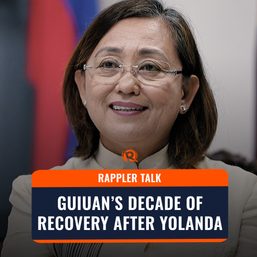SUMMARY
This is AI generated summarization, which may have errors. For context, always refer to the full article.

The Philippines is now front and center of the Loss and Damage Fund, which is intended to assist developing countries reeling from the adverse effects of the climate crisis.
The recent selection of the Philippine as host of the board of the Loss and Damage Fund last July 9 was lauded by the international community, as well as various environmental and climate justice groups.
The country could be a “formidable voice” in discussions about global climate action, said President Ferdinand Marcos Jr. in a statement released hours after the news.
What make for loss and damage?
What constitute loss and damage are negative consequences that Filipinos are already intimately familiar with – damage due to severe storms, loss of livelihood because of droughts and rising sea levels.
The fund was approved during the 28th session of the Conference of Parties (COP) in Dubai, United Arab Emirates, in 2023.
The World Bank will house the fund under an independent secretariat. The co-chairpersons of the board will have to hammer out the details with the World Bank covering scope, structure, and elements of the financial intermediary fund.
The selection of the Philippines as host country comes four months before the next COP that will be held in Baku, Azerbaijan.
The idea of the fund hinges on the “polluters pay” principle, which makes rich countries and carbon majors responsible for the climate crisis accountable for the losses that vulnerable nations have to deal with.
The fund itself, and its being finally put on the table for negotiations, are the handiwork of many past delegations and advocates.
There has been enough scientific evidence to conclude that the planet’s warming has increased and is being hastened by human activities. However, science has yet to catch up to answer this question: to what extent did climate change exacerbate an extreme weather event?

Why playing host matters
As host, the Philippine government will organize future meetings of the board in the country. Headquarters will be established here but no specific location was disclosed.
In a briefing held last Friday, July 12, Environment Undersecretary Analiza Rebuelta-Teh explained that in its bid, the country had to prove that it has available and accessible facilities, from venues to personnel, to host the board.
The Philippines will also have to negotiate with the co-chairpersons of the board (South Africa’s Richard Sherman and France’s Jean-Christophe Donnellier) regarding the host country agreement.
Environment Secretary Toni Yulo-Loyzaga said during the briefing that the Philippines playing host is a big deal because climate funds are often based in developed countries. As host, the Philippines could represent the climate-vulnerable.
“[H]aving ourselves recognized as being the host for this board is in itself quite significant,” Loyzaga told reporters on Friday. “The Adaptation Fund is hosted in Germany. And I think the Green Climate Fund Board is hosted in Korea.”
What are next questions to ask?
In these negotiations, the devil is in the details.
Further questions that should be asked as details of how the fund would be tapped: Can the fund get bigger? How will poor people get the fund? How can civil society participate and intervene, when necessary?
As of now, wealthy countries have pledged around $700 million to the fund, an amount that seems substantial but is not nearly enough, according to advocates.
“It’s unacceptable that the Fund has received only $661.39 million in pledges when loss and damage will cost $447 to 894 billion a year by 2030,” said Lidy Nacpil, known climate justice activist, citing data from political education institution Heinrich Böll Foundation.
“It’s particularly shameful that the United States has pledged only $17.5 million when they’re the largest historical emitter of greenhouse gasses and therefore most responsible for the climate crisis,” Nacpil said.

Asked during the press briefing if she was confident the fund would get bigger, Loyzaga answered with a resounding yes.
“Yes, I’m confident,” Loyzaga said. “I believe we’re at the point in the discourse internationally where developed countries have recognized their role in opening up the resources that are needed in order for those who have contributed the least to actually be able to cope and survive and thrive under these conditions.”
Getting more pledges for the fund is one thing, having people easily access it is another.
Mark Joven, the Philippines’ representative to the board, said that the fund “allows for a small-grants window.”
“[B]asically it allows for rapid access if in case people’s communities and sub-nationals are affected by disasters, which are very sudden,” said Joven in the same briefing.
Joven mentioned too that the proposed Climate Accountability Act, which creates a local loss and damage fund, would work as a counterpart to the global fund. The bill is pending with the committee in the House of Representatives.
On the question of inclusivity, groups have already submitted to the board last June 27, their comments and recommendations to have “meaningful representation” of communities.
The document demands that representatives from the youth, women, Indigenous Peoples and environmental nongovernment organizations, be invited as active observers in board meetings, even in closed or executive sessions.
If this is granted, will hosting by the Philippines of the board’s office be advantageous for Filipino environmental advocates? – Rappler.com
Add a comment
How does this make you feel?


![[Under 3 Minutes] Kumusta na ang Yolanda housing projects?](https://www.rappler.com/tachyon/2023/11/title-card-ls-3.jpg?resize=257%2C257&crop_strategy=attention)


![[OPINION] To the residents of sinking Metro Manila, is there relief?](https://www.rappler.com/tachyon/2024/07/tl-flood-legal-relief.jpg?resize=257%2C257&crop=268px%2C0px%2C720px%2C720px)












There are no comments yet. Add your comment to start the conversation.